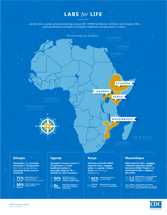Surveillance System Strengthening
CDC is building the capacity of resource-constrained nations to strategically collect and use information for program accountability and improvement. CDC collaborates with U.S. government partners (USG), Ministries of Health (MOHs), non-governmental organizations, U.S.-based universities, and the private sector to achieve this goal.
To improve the quality of data being collected, CDC has developed training materials and supports regional and national surveillance trainings and workshops, assists the Joint United Nations Programme on HIV/AIDS (UNAIDS) and the World Health Organization (WHO) to conduct regional workshops on HIV estimates and projections, and provides expert consultation on the modeling used to develop these estimates and projections.
Building Sustainable Surveillance Capacity
To help nations understand their HIV epidemic, CDC:
- Builds in-country capacity to design, implement, and evaluate HIV/AIDS-related surveillance systems and surveys; and assists and trains countries to analyze, disseminate, and use HIV/AIDS data.
- Evaluates and implements novel approaches for conducting surveillance and surveys.
Information from surveillance activities allows countries to make informed decisions about HIV service needs. To facilitate decision-making, CDC collaborates with MOHs, WHO, and USG partners to develop tools, guidelines, recommendations, and policies to translate research for improved planning and program implementation.
Notable Accomplishments
CDC, along with other USG agencies, international partners, and the governments of host nations, provides technical and financial support for national HIV surveillance efforts in the following ways:
- In Brazil, the National AIDS Program piloted new sampling methods to perform behavioral surveillance among the most vulnerable, hard-to-reach populations at risk for HIV transmission. The National AIDS Program is preparing its first national behavioral surveillance round.
- In Vietnam, Uganda, and China, CDC is supporting MOHs in understanding the dynamics of their epidemics, by providing training in how to use and analyze the BED assay for measuring recent infection with HIV.
- In Vietnam, Brazil, Honduras, India, Uzbekistan, Kazakhstan, China, Serbia and Montenegro, Tanzania, South Africa, Papua New Guinea, Albania, and Russia, CDC has trained MOH surveillance officers and survey administrators to use Respondent Driven Sampling (RDS) to reach hidden populations at high risk for HIV transmission, including injection drug users, people in prostitution, high risk heterosexual men, and men who have sex with men.
- In Angola, CDC supported the MOH to implement and subsequently expand the first post-conflict antenatal clinic sentinel surveillance round.
Labs for Life Infographic:

Get email updates
To receive email updates about this page, enter your email address:
Contact Us:
- Centers for Disease Control and Prevention
1600 Clifton Rd
Atlanta, GA 30333 - 800-CDC-INFO
(800-232-4636)
TTY: (888) 232-6348
24 Hours/Every Day - Contact CDC-INFO
 ShareCompartir
ShareCompartir


